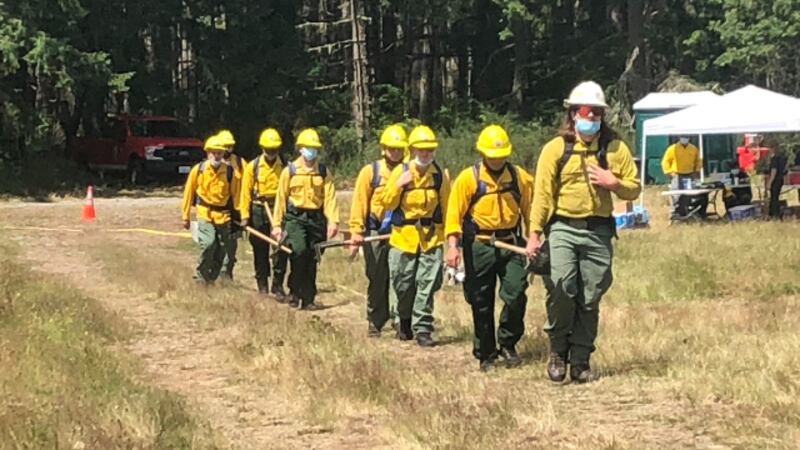We are tracking very dangerous heat across western Washington that will likely last through next week.
That brings another danger — wildfires.
But hundreds of firefighters have been training for these conditions on land and in the air.
Ryan Schwend, a National Guard helicopter pilot, is one of them.
“From all we’re hearing from meteorologists from the DNR, this will be an intense fire season,” says Schwend.
One that could kick into high gear this weekend.
“Am I worried? I would say, I don’t know if I’m worried. My process is — I’m preparing,” says Josh Riepe, a firefighter with the Department of Natural Resources.
New recruits are preparing.
They undergo safety briefings, learn to use equipment to dig fire breaks, run hose lines, spray down grass, and protect themselves with fire shelters.
More than 780 firefighters have gone through the DNR training this year at Joint Base Lewis-McChord, including dedicated state crews and the National Guard.
The state has also started to train with local fire districts and tribes. The goal is to have the same baseline skills for every team. And working together in advance helps coordinate during an emergency.
Riepe says they’re also preparing for this weekend by moving air and ground resources strategically across the state for quick responses.
“And probably an increased response. Whereas we’d only send one engine this weekend we might be sending two,” says Riepe.
The fire risk that has increasingly threatened farms and homes east of the mountains has intensified right here in the west.
“And last year was an example of that. On Labor Day weekend we had a number of large fires that were on the west side of the state,” says Riepe.
Like the Sumner Grade Fire, which left scars in Bonney Lake.
And Enumclaw, where neighborhoods meet wildlands full of fuel.
“The environment and the dear lord is going to decide what our fire year looks like. But we will have more people ready and more people equipped this year than we did before, says Sergeant First Class Peter Schuldt, a National Guard firefighter who has been on the lines since 2015.
Washington has grown its helicopter fleet from 7 to 11 since 2019.
And thanks to new funding, the state is expected to get more air support next year.
“I’ve seen it firsthand. When you can put water out ahead of the heat or right on it as needed that makes a huge difference,” says Schuldt.
Until then, the National Guard will step in.
“We’ve got crews laid out for the summer. People are prepared,” says Scwend.
And firefighters in every part of the state will be standing by.
“We’re all on high alert. Working ready to respond hoping that that barbecue on the lake does not start a fire or be impacted by a wildfire impacting the lake,” says Riepe.
Washington has had 517 fires on state land alone so far this year. That is a record, up from 336 fires this time last year.
©2021 Cox Media Group








